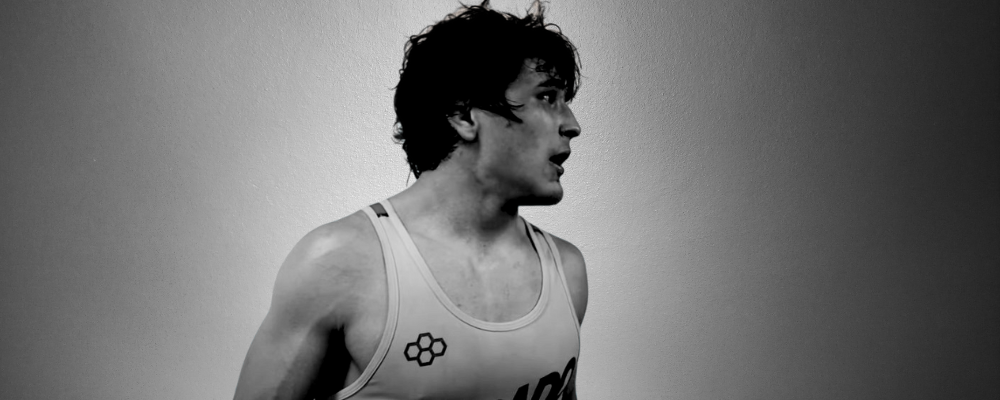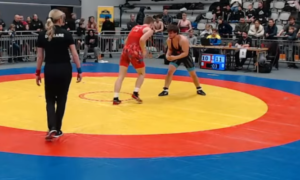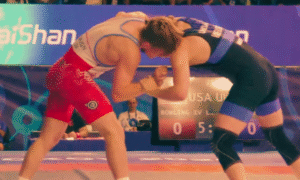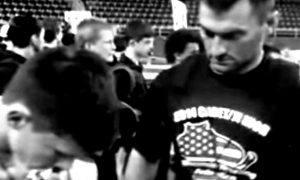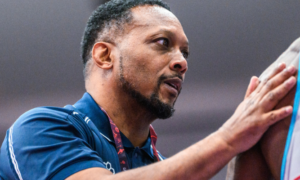It was not just one age division being contested in Geneva, Ohio on the last weekend in May, but two. Athletes in both the U20 and U23 segments battled for (potential) World Team spots, which means that there were 20 young Greco-Roman wrestlers who had accomplished what is a very important goal. 20 hungry, promising combatants, all of whom made obvious significant impacts in the tournament, all of whom certainly stood out among the talented collective.
But none more so than Patrick Brackett (72 kg).
That is the verifiable consensus, thus rendering such a declaration closer to actual fact than a mere opining with regard to the event’s outcome. Fans noticed him. Coaches did, too. Perhaps most telling of all, many of the other competitors from the weekend likewise agreed that it was Brackett who shined the brightest.
It was one of the most glaring “turn the corner” performances for a US athlete at a major domestic tournament in quite some time. The setting was familiar: solid wrestler with obvious potential, but one who had endured some recent struggles, goes and takes out an impressive string of opponents to eventually reign supreme over the field.
Brackett, 19, did not arrive in Geneva riding high. He had finished out of the running at the US U20 Open in April, and dropped matches elsewhere in the time between that event and the Trials. Therefore, Brackett entered without a seed before, in succession, earning wins against every prominent antagonist in his path. There was nothing flashy about his methods, either. The basics are what win, in every discipline of wrestling. Brackett dispatched of his opposition by consistently and ardently exacting unrelenting pressure, and then executing must-have scores whenever he found himself in top par terre. You often hear coaches spit out tropes like “Wrestle your match”. This is precisely how Brackett operated. He was less concerned with destruction than he was de-construction. Inch by grueling inch, he simply imposed his style in uncompromising fashion, which led to the game plans of his opponents gradually falling apart at the seams. While none of Brackett’s matches were easy, they were all easily won, in a sense, due to this directive.
The U20 Trials represented the first in a three-step process. The second is the preparation phase for the World Championships (scheduled for September in Pontevedra, Spain). Currently, Brackett is hard at work at the Olympic and Paralympic Training Center in Colorado Springs where he hones his skills under the watchful eyes of coaches Ismael Borrero Molina and Cheney Haight. He also has his older brother (and top USA Senior) Tommy to guide him along, not to mention a host of other premier American athletes who have similarly influenced his development. And yes, Brackett will also be setting his sights on fighting for a Fargo Junior title later this month. It has been a longtime objective. Brackett understands that the Greco displayed at Fargo is unlike that which he will encounter overseas, but there is also no denying the tournament’s perception as a right of passage for motivated wrestlers. At the very least, the event promises a fitful competitive test.
Step #3 you already know — strolling onto the mat at the Worlds. One advantage Brackett has is that, as mentioned, he is surrounded by athletes, including his own brother, who have previously experienced what it’s like to stand toe-to-toe against the best competition in the sport. Of this, he is cognizant. Things might hit differently when it is his turn to mind the rules of engagement in Spain, but Brackett won’t be daunted by what he discovers, either. Amid his struggles this past spring, Brackett never once doubted himself. He says that he knew it was just a matter of time when his results would no longer be capped or stymied by fleeting mental hang-ups or in-match second guesses. If the lead-up to the Trials proved anything, it was that Brackett was correct to remain confident in the face of adversity. That approach will not change heading into the World Championships and shall follow him closely as he continues to progress in real-time on the highest level of competition available.
5PM Interview with Patrick Brackett
5PM: In the winter of 2023, you went over to Sundsvall, Sweden where you trained and competed. That was your first overseas experience. You saw your brother travel a lot and go through the same thing. Did it meet your expectations? And what were a couple of the takeaways you had at that time?
Patrick Brackett: Yeah, I would say that it definitely met my expectations. Obviously, the level of Greco over there is a different level than what we see in the US. What I took away was their style. A lot of Americans are mainly “push-push”. They (Swedes) have a lot of “pull”, and a lot of finesse with what they are doing. I would say their style on-the-feet, and from training there, that I realized that I for sure needed to get better from par terre bottom. Because, they’ll eat you alive if you’re not ready to defend down there.
5PM: How would you compare the live wrestling component to how it is in our country? As far as just training goes, was it as competitive?
PB: Oh, yeah. Those guys — whether it’s a two-minute go, three-minute go — they go hard. They’ll go hard for however long it is. They definitely don’t take shortcuts. They don’t take goes off. If you’re going live on the feet or doing pummel goes, they will beat you down if you give them the chance.
5PM: As someone who is in the US program and still an age-group developing wrestler with Senior aspirations, what have you found as, or think are, the biggest challenges?
PB: I mean, I’m obviously very grateful. I train at the Olympic Training Center, I have great partners and great rooms. But I wasn’t always there. I’d say that the biggest challenge is to find good coaches who believe in you, and good training partners who are going to push you. I’d say those are the biggest challenges.
5PM: You had the National tournament in late-April. It wasn’t the best tournament of your life.
PB: (Laughs) No, definitely not.
5PM: I’m going to guess that after the tournament you were somewhat disappointed.
PB: Yeah.
5PM: What was going through your mind over the next month as you prepared for the Trials? How did you reconcile it?
Patrick Brackett: I think that my biggest problem in that tournament was that, mentally, I wasn’t ready for the fight that was brought to me in the matches I lost. You know, honestly, during that month afterwards it was a lot of mental training. I competed a lot. I went to the Western Regionals, did the Colorado state tournament. Just getting more competitions, getting more comfortable on the mat. It was just mental. I knew what I was capable of, and knew what I was doing in the room. I just needed to replicate that on the day of the tournament.
5PM: I talked to your brother in the morning right after the U20 Trials. I asked him what adjustments you had made that he saw. I asked Tommy because he is very cerebral and so I expected a thorough answer. But he just said that you “flipped the switch”. It was that simple. It’s exactly what he said. What was this switch-flipping that you did entering the Trials?
PB: The switch was more just believing that I could do it, despite being dejected from losing in other tournaments and not performing how I wanted. It was just believing I could do it. I’ve been training full-time for a couple of years and knew that it would eventually pay off, all of the sacrifices that I made. When it came to the day of the Trials, I just made it happen. I believed that I could do it and wasn’t going to let anyone take it from me.
5PM: As an aside, I talked to other guys who competed in that tournament, in both age divisions, and unanimously they all agree that you had the best tournament. Other champs, whatever, to them and basically everyone else, you were the star of that tournament. And your level of assertiveness I thought was part of it. You had the right mix of aggression and patience that is always a sign of competitive maturity. And to you, all of this really just came down to confidence in execution?
PB: Honestly, yeah, I would say so because in the room I can wrestle very well against high-level Senior Greco guys. It was definitely all in the confidence. My mindset going into the Open wasn’t really the best. I mean, I thought I could win and that I would just go out and perform. But when adversity hit, I wasn’t really ready for it. I wasn’t ready to push past that and find out what I needed to do to win.
At Trials, every match, it didn’t matter what the score was, I knew that I was in it. I know that I can put up a lot of points quickly so I stayed on the pedal. I really don’t think anyone can keep up with my pace for six minutes. I think I can hold my position very well. And I stuck to my game-plan of staying tight on the feet, moving people, getting them tired, getting them put down, and getting the turns.
5PM: In those other tournaments where you did not perform as well, it sounds like you never got down on yourself about it. It sounds like you looked at the other matches and identified what went wrong and why, but without putting your brain through the wringer over it.
Patrick Brackett: Exactly. I knew that all of the tournaments leading up to the Trials were just preparation. That’s how I kept it in my mind. Even despite losing in all of these tournaments, even the week before, I knew that all of the work I put in would show eventually. And it happened to show on the biggest stage.
5PM: Your lift I thought was super-interesting. You were locking pretty high, at least higher than what is the norm, and I thought it was brilliant because it was like a safety mechanism. Even if the lock slips down, then fine, it’s mid-range, anyway. Start high, then worst-case, the lock slips into textbook position. Was this something you had engineered for yourself? Or is this just how you like to get lifts?
PB: I wouldn’t say that I purposely did it for any reason, but I do like going high. I found that it is a lot easier to stop people when you get that high lock and start putting pressure on them. They can’t really move that well. And then I’m confident when I get a lift that I’ll score every time. When you start really high like that, I know that at worst it will slide down to the ribs, which is right where I want it. Even if it’s up high, I have a crash gut. I have a lot of options off of it.
5PM: Is this something that you developed on your own as a signature lift?
PB: I have Coach Borrero at the OTC and he preaches to lift a certain way, and mine is similar to his. But yeah, in the room during par terre goes, I find that my high lock is the easiest one to get. And then once I throw the pressure on, it’s game-over.
5PM: A couple of the guys you beat in the Trials you had lost to previously. These are very tough competitors who also bring pressure but it seemed like your work in the ties always had a purpose, and this I think was evident in your legs and how you were eating up ground. It wasn’t pummeling for pummeling’s sake. Does this sound correct?
PB: I would definitely say that’s what it was. I mean, on the feet, to be honest, I don’t have the most scores. I can’t go out and bomb bodylocks like some people can. But I know that I can move people around, especially if I can move my legs for six minutes in a match. In my mind, as long as my butt is to the center and theirs isn’t, I feel like I’m winning the match. As long as I keep them out there, I am taking away a lot of offense from them, and I just don’t stop working. Even if I’m just pushing them around the mat, they are circling, they are getting away from the edge, and I know that is getting them tired. Every time I push them to the edge and they escape, they are getting more tired. And I know that I can wear someone down doing that.
5PM: At the Nationals, your weight class had a lot of athletes. At the Trials, it was a much smaller bracket and you had to go through every major guy. Four opponents in total, and all four were positioned well coming out of the Nationals. Prior to the finals against Brett Back, were any of your wins in the challenge tournament more satisfying than the others?
Patrick Brackett: The (Braden) Stauffenberg and (Tyler) Antoniak ones were satisfying. Stauffenberg at Fargo two years ago beat me in the semifinals. He kind of pushed me around and beat me 7-1 or 8-1. And then Antoniak had tech’ed me in like :40 at the Open.
5PM: Brett in the finals, you had obviously gotten a look at him prior. What were the conversations like between you and Coach Tommy before the best-of-three?
PB: Honestly, the conversations were to just keep wrestling how I was, to keep wrestling smart. Brett in our past matches had been able to just blitz me and put a lot of points on the board to end it early. Which, he has. I just knew with him to stay in tight and wait for my chance on top, and that’s all I can ask for. I’m very confident in my skills from top par terre. No matter how many points others can get on me from there, I know that I can get more. It was to wrestle smart, stay in tight, get put on top, and end it.
5PM: You got Match 1, that’s the biggest one to get usually. Was that a weight off your shoulders?
PB: That’s kind of a tough question because it was, Yeah, I know I can beat this guy, but I’ve got to do it again. The job’s not finished. It was, Okay, just go out there and do the same thing one more time.
5PM: He had a good first period in Match 2, it is where he scored all of his points. You were only down by a point going into the second period. What was the game plan for that last three minutes?
PB: My game plan going into Period 2 of Match 2 was to try and get on top, but that wound up not being the case. The refs weren’t really giving it to me there. Going in, I was like, I’m going to pummel and get put on top; but then with around 1:10 left, I knew that they weren’t going to give me my shot from top. So right then, I knew that I had to take it. I just had to find a way to put points on the board and win.
5PM: Not to ask a corny question but this was your first Trials victory. What does it feel like to win a World Team Trials?
PB: It feels like everything I could have imagined and more, I would say. It felt so good to see all of my sacrifices and all of the work I put in through the years finally pay off with the goal I’ve been working for, to make World Teams. I finally did it.
5PM: Has making the World Team changed how you see yourself as a wrestler? Has it imparted even more confidence as far as training is concerned?
PB: Yeah, after winning something like that, it definitely boosts your confidence. But to begin with, even when I wasn’t winning these tournaments, I still believed. I had the confidence that I was good enough. The confidence has definitely carried over to training very well. I know, especially after wrestling that tournament, that I can beat anyone. And I know that I’m in any match. It helps me keep going, especially after achieving that goal. It shows that I’ve been doing the right things, it shows that I’m in the right place, and that I just need to keep working.
5PM: This conversation began with your first overseas experience. Now you’re about to get another one. Europe just had their U20 tournament and Asia’s is coming up soon. Do you look at any potential foreign opponents you might see at the Worlds?
PB: I’ve kind of looked at the whole landscape from the Europeans at 72 kg. But I would say that I’m not focused on any one guy. The way the bracket is formatted, I could get any of them. I just look at it as that they are all good wrestlers and I have to be able to beat all of them.
5PM: You have your brother, who is a fantastic wrestler and whose style is a depiction of how this sport should be competed. But at the OTC, you have plenty of others with whom you train. Who are some of your favorite workout partners?
PB: It’s tough to just name a few, but definitely Robert Perez. He has a great pace on the feet. He can out-pummel anyone, I’m confident about that. He’s a good partner, he definitely pushes me hard in the room. Hunter Lewis, he gives me a very good feel. He is tricky, has a nasty front headlock. I love going with him. And definitely Noah Wachsmuth. Without a doubt, I think he has the best par terre in the country, and one of the best lifts. It is tough going down against him. He definitely works your par terre because he’s not going for two there, he is always going for four.
5PM: With the knowledge base you have around you, how have they been preparing for the World tournament? Not just technically, but also just through conversations in addition to the physical part?
Patrick Brackett: We have a good team down here at the OTC. Everyone wants to see each other succeed, especially my brother. Also, Cheney Haight. They fuel you with a lot of confidence. In April, things had gone rough at the Open and Cheney told me, “You know, you could still make the Team. You’re just going to have to hit that reset switch in your head and get ready to do it.” Cheney has never stopped believing in me, regardless of the wins and losses. He knows the skills that I have and he believes in them. As a team, the wrestlers and coaches, everyone just tells you good things like, ‘If you wrestle smart, you can win this thing. You just have to believe that you can do it’.

Listen to “5PM57: Kamal Bey and David Stepanyan” on Spreaker.
Listen to “5PM56: Rich Carlson and Spencer Woods” on Spreaker.
SUBSCRIBE TO THE FIVE POINT MOVE PODCAST
iTunes | Stitcher | Spreaker | Google Play Music


